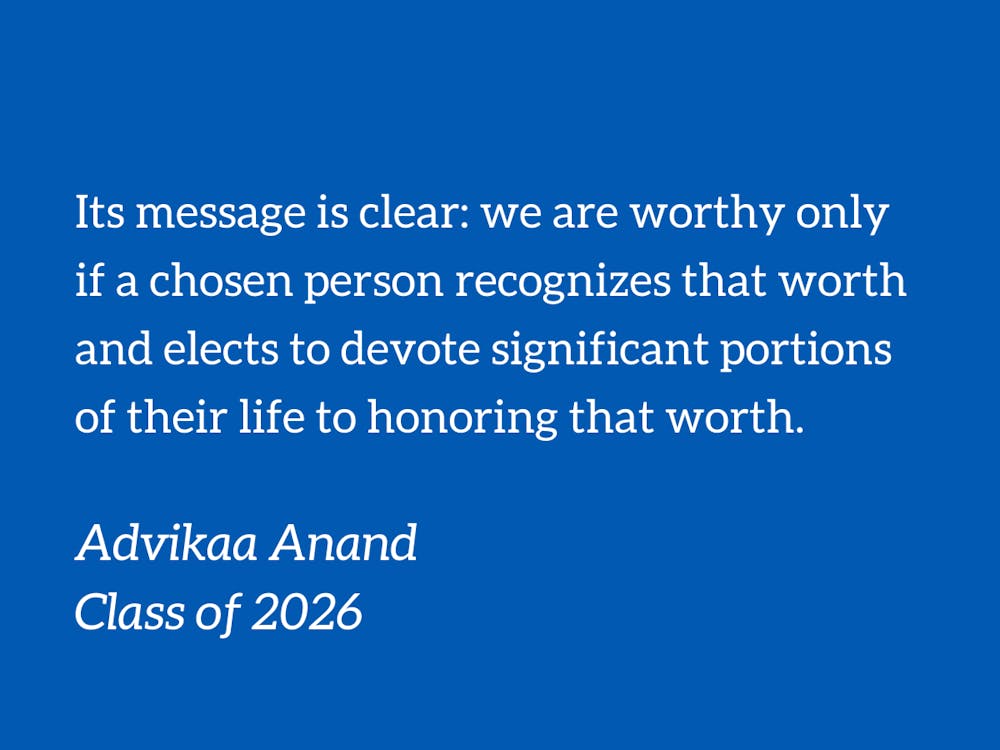Wilting roses are currently deposed in my dorm’s hallway trash can. Their fading fragrance sends a clear message: the love, all too pervasive in the air a few days prior, is now merely a dying relic.
Valentine’s Day and all the red, rosy things that accompany it embody our obsession with romance. We idealize notions of love, and this emotion permeates all dimensions of modern popular culture. Violent action movies, with blood and guts splattering the screen, are not replete without a romance at stake. Adventure and mystery novels tend to have a gradual affection that grows into everlasting feelings. No cultural creation is complete without the love angle.
So pervasive is our all-consuming ache for a soulmate in Western culture that great thinkers such as Plato sought to explain it: man was originally created as a four-armed, four-legged creature, but fearing the threat such a being might pose to the gods, Zeus had him wrenched apart, his eyes gazing upon all the parts of him that were incomplete, condemned to forever ache for someone to complete him.
Yet, this chase after a singular human being that mends all the broken parts of us is not as universal as one might think. In fact, notions of romantic love and its eventual culmination in an enduring relationship are endemic to Western culture and foreign in other parts of the world. Other cultures consider other factors paramount to a relationship’s longevity, such as family backgrounds, overall compatibility of life experiences, and social obligations to raise the next generation with prized values.
And this cult of “amatonormativity” — the widespread assumption that everyone is better off in an exclusive, romantic relationship and that everyone is seeking such a relationship – breeds weighty negative ramifications. It propels people to assume that anyone who does not prescribe to this norm “must be weird or defective.” The consequences are everywhere, “informing how single people view themselves, why unhappy people stay in relationships, and how personal growth and the achievement of adulthood are supposed to work.”
As researcher Paula DePaul explains of the marriage narrative, “It’s hurting single people because they’re led to believe that there’s something wrong with them, something wrong with their lives. And it also hurts married people . . . because they think, if I am single there’s something wrong with me.”
Amatonormativity has become correlated with personal success, perceived to be emblematic of a person’s goodness and intrinsic value. After all, how common is the phrase, “You’re so wonderful, how are you single?” Such rhetoric posits our worth as contingent upon another person’s recognition of it.
Its message is clear: we are worthy only if a chosen person recognizes that worth and elects to devote significant portions of their life to honoring that worth.
It is a message that warps our socio-cultural structures, skewing them in favor of those who choose to be in long-term relationships. For example, although Justice Anthony Kennedy’s defense of same-sex marriage paved the way for marriage equality, it also sends the message that without marriage,” one lives without dignity, in lonely condemnation.”
The obsession with marriage afflicts women and empowers men. While single men are viewed as independent bachelors, women who choose not to get married are seen as spinsters, “holed up with her books and cats.”
I watch as this toxicity trickles into my own relationships. As I share snippets of my new life with old friends, I feel embarrassed when they share that they are happy and in love and I am only happy. How can we both be the same kind of happy?
These stories maim the hopeless romantic in me — the one that, having devoured the big love stories of the silver screen, searches for her own. They leave me feeling restless, as though I am doing something wrong, as though finding fulfillment in a romantic relationship is the most organic thing in the world, and when it doesn’t fall at your feet, you must be the problem, especially if you’re a woman. Surely, you are too ambitious, too smart…simply too much, and that’s what’s driving them away.
But I am learning to silence the voice in my head and to shed the shackles of a culture that imposes its norms of inadequacy upon me, only because I made a choice that makes me happy. I am shredding notions of being incomplete and embracing being unfinished.
Most importantly, I am learning to treasure the most underrated kind of relationship: friendship, a relationship that doesn’t blaze like fire but that strives to inspire. Because while there is passion in love, there is peace in friendship, and I think, at the moment, I choose peace.
Advikaa Anand is a Trinity freshman. Her columns typically run on alternate Thursdays.
Get The Chronicle straight to your inbox
Signup for our weekly newsletter. Cancel at any time.
Advikaa Anand is a Trinity sophomore and an opinion managing editor of The Chronicle's 119th volume.

